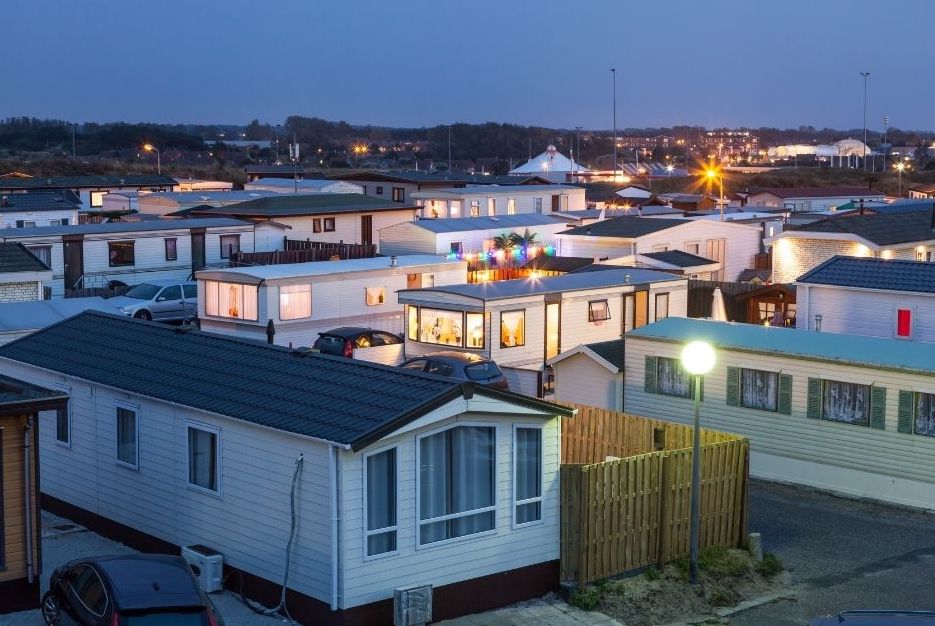
NPR Reports on Private Equity Acquiring Mobile Home Parks and Rendering Them Unaffordable to Homeowners Who Live There
August 31, 2021
Earlier this month NPR’s Planet Money investigated what happens when big investors like private equity firms spend hundreds of millions of dollars buying mobile home parks and make them less affordable for the people who live there.
NPR, August 6, 2021: “Mobile Home Parked”
The hosts spoke with a mobile home owner whose land was bought by Havenpark Communities, a private equity real estate investment company that has been buying up mobile home parks across the country.
Open Door Capital CEO Brandon Turner shared how “mobile home parks are predatory…. In fact, what the industry often does and has taught is that if you go into a park and these people own a home that is on the land but they can’t be moved… what the companies will do is they’ll come in and they’ll take the rent, and they’ll go from $250 all the way up to $500, and they can’t do anything. And this company then just makes a lot of money.”
NPR called this inelastic demand a “kind of a dream” for investors. “A lot of people own mobile homes they can’t move. They have to keep paying.”
See our 2019 report with MHAction and Americans for Financial Reform Education Fund, “Private Equity Giants Converge on Manufactured Homes.”
NPR journalist Chris Arnold explained, “Another thing that the big investment firms do to get even more money out of these parks [according to several people in the industry], a company buys a mobile home park and starts jacking up the rents, which means the mobile home park is making more money, and that means it’s worth more money on paper. So the investor then refinances the mobile home park and takes out a big loan. Like when you refinance your house and get cash out of the deal, they do the same thing, and they pull, say, $3 million out. And then they go and buy another mobile home park and do it again and again and again. And this is one of the things that also makes mobile home parks a really good investment. You don’t need that much cash upfront to create this cascade of borrowed money to keep acquiring more and more parks.”
Worse, NPR reporter Mary Childs observed, “at least some of [these loans] have super cheap interest rates, thanks in large part to the federal government. Some of the loans are backed by Fannie Mae and Freddie Mac, the government-backed entities at the heart of the U.S. mortgage market. A big part of the reason Fannie and Freddie exist is to help more people be able to afford a house. And they do that by backing the loan, by guaranteeing it, which lowers the interest rate. They do this for individual homeowners, and they also do it for big corporations that build or buy apartment buildings and condos and mobile home parks.”
Arnold noted how Havenpark took advantage of this, receiving a lot of “super low-cost loans” backed by Fannie Mae, backed by the federal government. These loans were meant to support affordable housing. “But if Fannie Mae’s mission is to help people to be able to afford a home, all of this is not working out so well for…a lot of people…” In one mobile home park NPR looked at, there have been 15 eviction cases against eight different residents there in just the past year and a half.
The report goes on to show how some mobile home owners have been able to stand up to these giant corporate landlords and private equity companies that are buying up the land under them.
In Massachusetts as well as only a small handful of other states, mobile home owners have the right of first refusal. When a mobile home park goes up for sale, the people who live there get a chance to buy it first. They can turn it into a resident-owned co-op.
Unfortunately, homeowners have to match whatever amount the investor was willing to pay.
Arnold noted, “When the residents of a mobile home park want to buy their own park, they almost never get a super cheap loan backed by Fannie and Freddie, generally because the co-ops don’t have the cash for a big enough down payment. But the investors, those big companies that are buying up parks like this, they absolutely do have the cash. So that’s why they’re getting their loans backed by Fannie and Freddie. In fact, they got more than $5 billion worth of those government-backed loans just last year.”
Yet, “if residents of mobile home parks could get those loans backed, it would change the game. Residents could get easier access to loans at much lower interest rates, so they’d be more able to afford to buy up their own parks. A lot more parks could turn into co-ops.”
Childs repeated, “And again, one of the central missions of Fannie and Freddie is to help people afford homes. But they’ve ended up backing the corporate investors that are jacking up rent and not the actual people trying to afford their homes. And because the co-ops don’t have access to this magic rate-lowering tool, they have to charge more rent. So somehow, all of the options for mobile home residents are paying more rent or paying more rent.”
